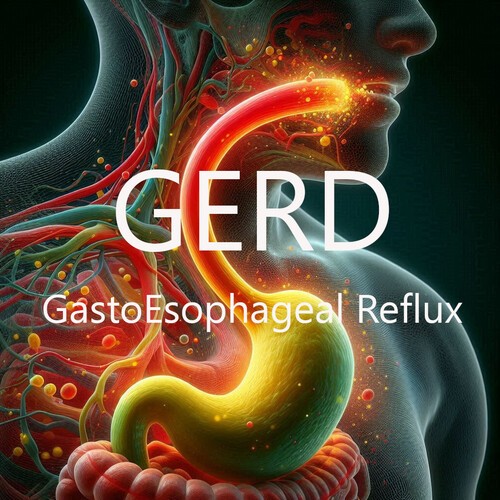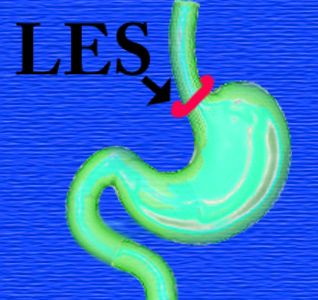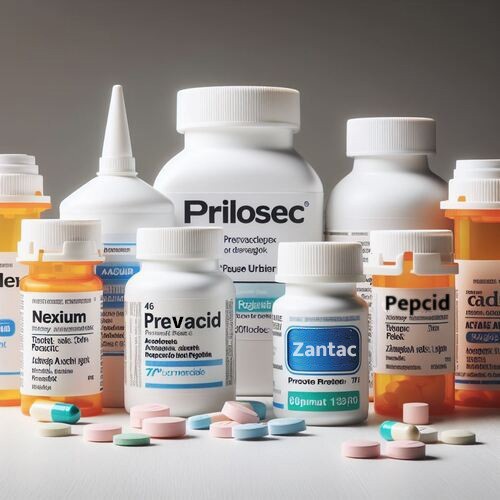
What is GERD?
Gastroesophageal Reflux Disease ( GERD) is a common disorder which causes the symptoms commonly referred to as heartburn. Nearly 60 million Americans suffer from these symptoms each month. Symptoms may include pain, pressure, or a fullness in the chest. Some patients may feel a lump in the throat or an acid taste in the mouth. Hoarseness and cough or throat clearing can also be symptoms. These symptoms are the result of acid, food and gas escaping from the stomach and migrating up into the esophagus ( food tube). Symptoms can last for many hours or days and are usually made worse by lying down or bending over. Unlike the stomach, the lining of the esophagus has little protection against acid. When acid gets into the esophagus it burns the lining and causes some of the symptoms described above. Chronic GERD can even increase the risk of cancer of the esophagus over many years.
What causes GERD?

There is a muscle at the lower end of the esophagus called the LES ( lower esophageal sphincter). In a healthy person, this muscle is supposed to tighten to close off the esophagus and keep stomach contents from coming back up. As we get older this muscle weakens in many people. Certain eating habits and foods can exacerbate this situation, and allow food to reflux up if the muscle is already weakened. Obesity, and pregnancy exacerbate the problem because they put pressure on the stomach forcing contents upward. Acidic foods make the stomach contents more acidic and cause them to irritate the esophagus more. Items that contain caffeine may weaken the LES and cause it to open allowing acidic contents up into the esophagus more easily.
THINGS THAT WORSEN GERD
- Citrus fruits
- Chocolate
- Caffeine - coffee, tea, cola, chocolate
- Alcohol
- Fatty and fried foods
- Garlic and onions
- Mint
- Spicy foods
- Tomato-based foods, like spaghetti sauce, salsa, chili, and pizza
- Lying down less than 2-3 hours after eating
- Eating rapidly
- Eating a few large meals rather than more smaller meals
- Obesity
- Pregnancy
- Smoking
How is GERD treated?
Treatment of GERD can be accomplished often by modifying some of the lifestyle issues mentioned above. For some patients that may not be enough. When that happens, medications may be recommended
Lifestyle Changes
When lifestyle changes alone don't control the symptoms medication may be necessary. Medications fall into three basic categories.
Medications
Lifestyle Changes
- If you smoke, quit.
- Avoid foods and substances that worsen symptoms ( see above).
- Lose weight if needed.
- Eat small, frequent meals so the stomach doesn't get too full at one time.
- Avoid lying down for 3 hours after a meal to allow gravity to keep stomach contents from coming up when the stomach is most full.
- Raise the head of your bed 6 to 8 inches. This allows gravity to do its job all night
When lifestyle changes alone don't control the symptoms medication may be necessary. Medications fall into three basic categories.
Medications
- Antacids - These are over the counter remedies available in any drug store. They work by neutralizing stomach acids. Antacids come in two forms - Calcium products like Tums which are solid, and Magnesium based products likeMaalox and Mylanta which can be liquid or solid. Liquid antacids generally work better for GERD symptoms.
- H2 Blockers - There are many products that fit into this category including Tagamet, Zantac, Pepcid, and Axid. These are not antacids. Instead, they bind to a receptor called the H2 receptor. By binding to this receptor they decrease the amount of acid the stomach secretes. These medicines are also available over the counter like antacids and are less expensive then the next category of medications but may not be as effective in everyone. There are many products that fit into this category including:
- Tagamet,
- Zantac,
- Pepcid
- Axid.
- Proton Pump Inhibitors - These are the newest and most potent inhibitor of acid secretion in the stomach. They inhibit the acid (or proton) pumps in the stomach by a different and more efficient method than the H2 blockers. These medicines are some of the most effective but also the most expensive medications for treating GERD. Members of this class of medication include the following:
- Prilosec
- Prevacid
- Aciphex
- Nexium
- Protonix
Surgery
- In rare cases when the above measures do not work, surgery may be necessary. This should only be done when all other efforts have failed.
